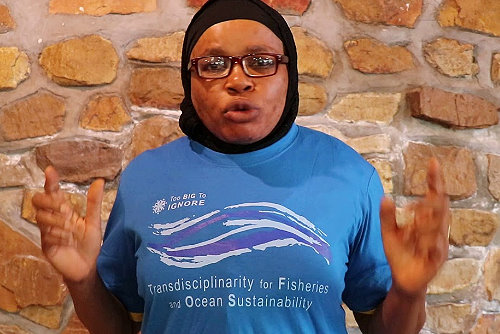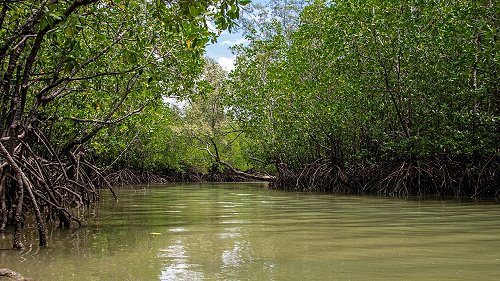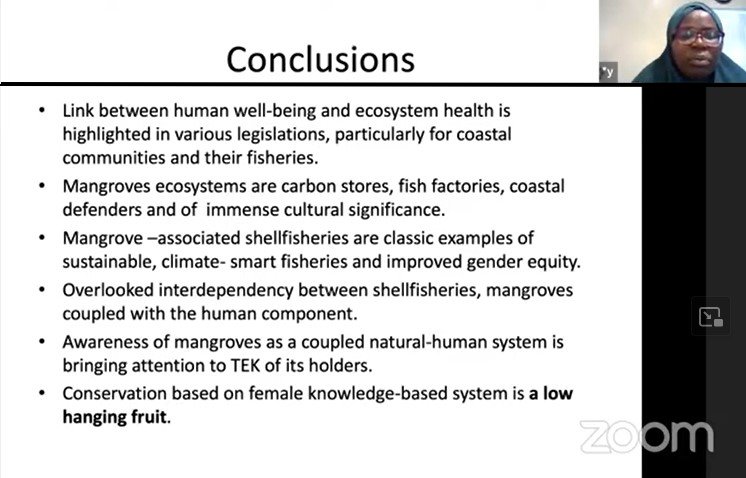 This thematic webinar lecture was delivered on 29 March 2024 by Dr. Kafayat A. Fakoya as part of the research collaboration on the Vulnerability to Viability Platform focused on small-scale fisheries in Africa and Asia. She holds a PhD in fishseries from Lagos State University (LASU) and is a V2V co-investigator, doing interdisciplinary research and consultancies. She is also a member of Mundus maris asbl with broad interests in research towards sustainable fisheries ecosystems and gender equity.
This thematic webinar lecture was delivered on 29 March 2024 by Dr. Kafayat A. Fakoya as part of the research collaboration on the Vulnerability to Viability Platform focused on small-scale fisheries in Africa and Asia. She holds a PhD in fishseries from Lagos State University (LASU) and is a V2V co-investigator, doing interdisciplinary research and consultancies. She is also a member of Mundus maris asbl with broad interests in research towards sustainable fisheries ecosystems and gender equity.
Her talk takes place against the background that in Nigeria, little quantitative data exists on mangrove use, livelihood dependencies, and the relationship between mangrove fisheries and human well-being. Recognizing the broad range of users who depend on or benefit from mangroves is crucial to developing adaptive and inclusive management approaches that reflect the interests of all users. The highest stakes for food and nutrition security, and livelihoods, however, are associated with mangrove-dependent shellfisheries, and this should be the starting point to foster a sense of stewardship and ownership to ensure sustainable mangrove use.

Mangroves, courtesy KMarius on Pixabay
Kafayat started out summarising resent research results on mangrove, which represent approximately 3 to 5% of global tropical forests, but punch above their space occusation when it comes to products and services they render in terms of wood, timber, coastl protection, food production, water filtration, medicines, tourism and recreation, but also spiritual and existential servicer. They contribute to 13 of the 17 Sustainable Development Goals (SDGs).
Mangroves are also important n the global carbon cycle, often referred to as blue carbon as their carbon storage capacity is 6.4 billion tonnes and thus two to four times higher than that of other mature tropical forests.
Conventional mangrove research focuses on the ecosystems, their structure and functioning, a feature requiring a lot of resources, human, financial, technical, which are not available everywhere. It has often paid little or no attention to the social and economic aspects of how mangroves are managed, though thankfully, this is gradually changing.
Engaging actively with local mangrove users and their traditional ecological knowledge (TEK) is a way to value people living in and from mangroves and filling critical knowledge gaps to curb rapid loss of mangroves.
World-wide an estimated 13.5% of mangroves are protected, but in Africa, only about 2%of the most critical mangrove areas benefit from protection. This is most challenging in high human population areas, near productive agricultural land and fishing grounds and economically valuable industries.

Mangroves are used a lot by women and people operating in the informal economy. As a result, while being considered the ’supermarket of the poor‘ the production is poorly recorded, if at all. In Senegal and Ghana for example, women are known to harvest mangrove oysters either by cutting them off the roots and often suffering injuries themselves in this hard-to-do job and damaging the roots in the process too. Development of raft culture of mangrove oysters is putting an end to the negatives and improves incomes and ecological results. On the long mangrove protected coasts of Nigeria women seem to be more active in fishing rather than shellfish harvesting. But study coverage is very scant.
To follow the full lecture and the Q&A session at the end on YouTube click here.
handwerklichen Fischerei Akademie
- Make Fishing Fair in the EU, 25 March 2025
- Beziehungen zwischen Mensch und biologischer Vielfalt über alle Skalen hinweg
- Weltfischereitag, gefeiert am 21. November 2024 in Nigeria
- Mundus maris participated in the 2024 World Fisheries Day organized by Canoe and Fishing Gear Association of Ghana (CaFGOAG).
- Beitrag von Mundus maris zur öffentlichen Anhörung zu UNOC3
- Gipfeltreffen zur Kleinfischerei in Rom, 5.-7. Juli 2024
- Regionales Symposium zur europäischen Kleinfischerei, Larnaca, Zypern, 1.-3. Juli 2024
- Baltic Fisheries Emergency Meeting, Brussels, 26 June 2024
- Ambivalent role of Market and Technology in the Transitions from Vulnerability to Viability: Nexus in Senegal SSF
- Shell fisheries as stewardship for mangroves
- Afrikanische Ausgabe des 4WSFC in Kapstadt, 21. bis 23. November 2022
- World Fisheries Day, 21 November 2023
- Webinar: Herausforderungen und Chancen der Fischerei in Nigeria
- Präsentation der FishBase-App auf dem Symposium in Tervuren
- MARE Conference on Blue Fear – Mundus maris reflects
- The Transition From Vulnerability to Viability Through Illuminating Hidden Harvests, 26 May 2023
- EGU-Veranstaltungen zum Thema Geoethik und gemeinsames Lernen
- Solidarität mit den handwerklichen Fischern in Senegal und Mauretanien
- The legal instruments for the development of sustainable small-scale fisheries governance in Nigeria, 31 March 2023
- Tools for Gender Analysis: Understanding Vulnerability and Empowerment, 17 February 2023
- Community resilience: A framework for non-traditional field research, 27 January 2023
- Sustainability at scale – V2V November webinar
- Europäische Ausgabe des 4WSFC in Malta, 12. bis 14. September 2022
- Beitrag von Mundus maris zum SSF-Gipfel in Rom
- Women fish traders in Yoff and Hann, Senegal, victims or shapers of their destiny?
- Die Akademie setzt ihre Arbeit in Yoff fort
- Illuminating the Hidden Harvest – a snapshot
- Virtual launch event FAO: International Year of Artisanal Fisheries and Aquaculture
- The Small-Scale Fisheries Academy as a source of operational support to PA Guidelines
- Welt-Fischereikongress, Adelaide, 20.-24. September
- Mundus maris unterstützt den Kampf von Paolo, dem Fischer, in der Toskana, Italien
- Catching-up – SSF Academy Yoff, 27 Febr. 2021
- Ausbau der Fähigkeiten der Akteure für eine nachhaltige handwerkliche Fischerei
- Testen von Trainingsmethoden während der Pilotphase der Akademie der handwerklichen Fischerei im Senegal
- Eine Premiere – Einweihung der Akademie der handwerklichen Fischerei in Senegal
